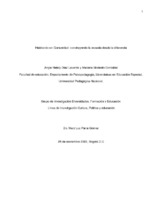Habitando en Comunidad : construyendo la escuela desde la diferencia.
Citación
Fecha
2022Autor
Díaz Laverde, Angie Nataly
Modesto González, Mariana
Director / Asesor / Tutor
Parra Gómez, Mary Luz
Metadatos
Mostrar el registro completo del ítemResumen
El presente ejercicio investigativo fue realizado en las IEDs del municipio de Sopó -
Cundinamarca en alianza con la Secretara de Educación y la Universidad Pedagógica Nacional
(UPN), partiendo del paradigma socio-crítico, con un enfoque de Investigación Acción (IA),
desarrollada en tres fases, I. Sensación, Dirección y Significación. II. Vivencias Significativas,
Individuales y Colectivas. III. Deconstrucción, Conciencia y Presencia.
Habitando en comunidad inició durante el periodo de confinamiento por la COVID 19
(2021 I); los primeros encuentros, mediados por la virtualidad permitieron entrever que las
acciones de educación inclusiva en el municipio concentraban su interés únicamente en la
población con discapacidad; situación que fue confirmada en la implementación de un índice de
inclusión (Ainscow y Booth, 2000), situando la necesidad de expandir la mirada de esta a una
que contemplase la diferencia de la totalidad del aula, concibiendo la otredad y la alteridad para
pensar en sentidos más amplios la inclusión educativa y habitar una cultura inclusiva.
Repensar la noción de diferencia e inclusión en la escuela, conllevó a cuestionar el
accionar pedagógico de los procesos inclusivos que se llevan a cabo dentro de los escenarios
educativos en Colombia, en este sentido, el objetivo de la investigación fue desarrollar
estrategias pedagógicas mediadas por el aprendizaje cooperativo establecido por Johnson y
Johnson (1999), para el reconocimiento de la otredad y la alteridad permitiendo desde las
voces de los estudiantes y la experiencia significativa con el otro una transformación del ser
desde el reconocimiento de la diversidad humana y el habitar en comunidad.
Abstract
The present investigative exercise was carried out in the IEDs of the municipality of
Sopó - Cundinamarca in alliance with the Secretary of Education and the National Pedagogical
University (UPN), starting from the socio-critical paradigm, with an Action Research (IA)
approach, developed in three phases, I. Sensation, direction and meaning. II. Significant
experiences, individual and collective. III. Deconstruction, Consciousness and Presence.
Living in community began during the period of confinement by COVID 19 (2021 I); The
first meetings, mediated by virtuality, allowed us to glimpse that the actions of inclusive
education in the municipality concentrated their interest only on the population with disabilities; a
situation that was confirmed in the implementation of an inclusion index (Ainscow and Booth,
2000), placing the need to expand the view of this to one that contemplates the difference of the
entire classroom, conceiving otherness and otherness to think about broader senses
educational inclusion and inhabiting an inclusive culture.
Rethinking the notion of difference and inclusion in the school led to questioning the
pedagogical action of the inclusive processes that are carried out within the educational
scenarios in Colombia, in this sense, the objective of the research was to develop pedagogical
strategies mediated by the cooperative learning established by Johnson and Johnson (1999),
for the recognition of otherness and alterity, allowing from the voices of the students and the
significant experience with the other a transformation of the being from the recognition of human
diversity and living in community.
Editorial
Universidad Pedagógica Nacional
Programa académico
Licenciatura en Educación Especial

